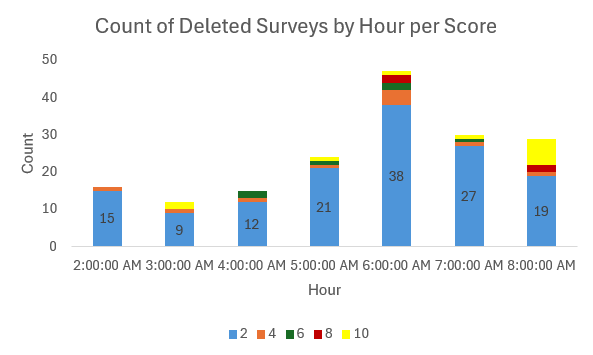
“Management is doing things right; leadership is doing the right things.” – Peter Drucker
Summary
Situation: During a major holiday, I received information that survey data was being deleted in an attempt to make customer sentiment appear better than it actually was.
Task: Undertake an investigation to determine if this was indeed the case.
Action: Downloaded the survey data for the relevant time period and created pivot tables to analyze the data. Discovered that a significant number of surveys, 82% of which had the lowest score, had been removed in the early hours of the morning. This would have artificially inflated the average survey score. Further analysis of IP addresses confirmed these were genuine submissions that should have been retained.
Result: Immediately shared the information with Human Resources. However, six weeks after the incident, I was terminated from the company as part of a workforce reduction plan.
Details
During a major holiday at one of my previous jobs, I was alerted by a co-worker who asked if survey data already pulled into Snowflake would be removed if deleted from Qualtrics. This unusual query, coupled with directives from my direct report to delay publishing crucial reports and have the co-worker review each report, raised my suspicions. Within minutes, I informed Human Resources.
I proceeded to undertake a detailed data review to confirm the deletion of surveys and identify the reasons behind it. The analysis revealed that a large number of surveys, 82% of which had given the lowest score, were deleted in the early hours of the morning. The deletion pattern suggested these were genuine submissions, not spam, as the deletions were evenly distributed across the timeframe. Further scrutiny of IP addresses corroborated that the surveys were genuine.

While conducting the investigation, my boss was dismissive of my concerns of potential data manipulation and insisted on having the co-worker run point on report publishing—an unusual protocol. Standard procedure in such cases would be to continue publishing reports with a note indicating an investigation was underway.
Ultimately, my investigation confirmed that leadership was deleting low-scoring surveys to create a false impression of customer sentiment. This was flagged as research misconduct, and I submitted all my findings to HR.
Several weeks later, HR confirmed my findings through a Business Intelligence lead. The department head’s justification for deleting the surveys was implausible and inconsistent with the facts. Despite following proper channels and doing my job, I was terminated as part of a workforce reduction plan a week later.
Lessons Learned
- Integrity in Data Management: Maintaining data integrity is crucial, especially during peak times. Manipulating data undermines trust and can have serious ethical implications.
- Effective Communication: Clear communication with HR and senior management is vital when dealing with suspected misconduct. Ensure all concerns are documented and follow up as needed.
- Persistence in the Face of Adversity: Even when your concerns are initially dismissed, continue to pursue the truth. It’s important to stand by your findings and ensure they are properly addressed.
- Ethical Responsibility: Upholding ethical standards is paramount, even if it comes with personal risk. Ensuring accurate and honest reporting is a fundamental responsibility.
- Awareness of Organizational Politics: Understanding the dynamics within an organization can help navigate complex situations and anticipate potential repercussions.